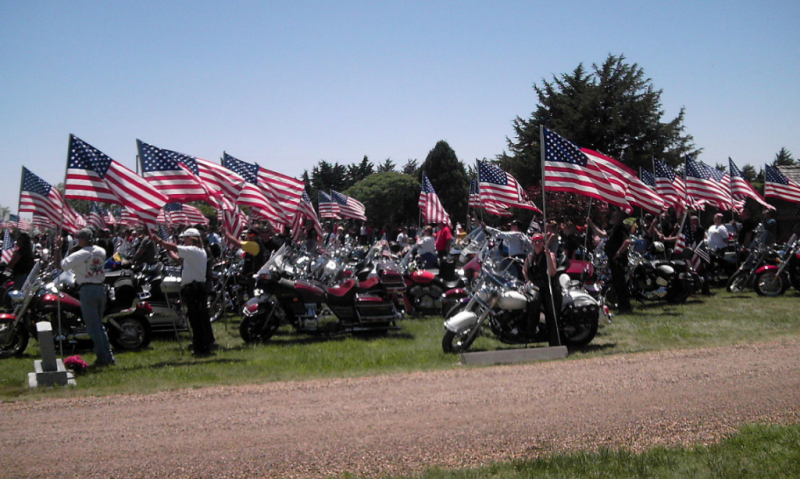
The Legion Riders who took part in a 2,100-mile journey to return the cremains of an Army veteran to his family in 2015 still remember their emotions from that experience.
Marine Corps Staff Sgt. Jonathan Turner spent 17 years in the military, doing a combined seven tours in Afghanistan in the process. In 2015, a year after retiring from the Corps, Turner died in California from combat-related issues.
Turner’s family, including his mother, lived in Georgia and couldn’t afford to attend his funeral and receive his cremains. As a result, those cremains were set to be mailed via Federal Express to the family.
That didn’t sit well with local members of the Patriot Guard Riders (PGR), a motorcycle organization founded by Kansas American Legion Riders and still comprised of Legion Riders from all over the nation. California PGR members reached out to other state captains and were able to organize what to this day is still the longest PGR “Pony Express Relay” on record.
Many American Legion Riders were involved in the relay and still have very vivid memories of how it impacted them. John Burke, the Alabama Legion Riders state director and the PGR assistant state captain for Northern Alabama, organized his state’s portion of the relay and then rode with it for 226 miles.
“The Patriot Guard Riders and The American Legion Riders are so intertwined in their respect for our active duty (military) and our veterans,” said Burke, a member of Post 171 in Birmingham. “They go hand in hand. In my area, a lot of our Patriot Guard Riders are Legion Riders, and so a lot of the PGR missions are manned by the Legion Riders. When we show up for a mission, it’s not about who you’re with. It’s about showing respect and honor to the hero and the family.”
Burke was with a PGR contingent that picked up Turner’s cremains just inside of Mississippi and escorted them to Georgia and transferred them to a group of PGR/Legion Riders. “You feel proud that you had the ability to (provide the escort),” he said. “You feel honored you’re able to participate in something of that magnitude. And then you have the sorrow that comes in because this is a fallen hero. You feel sympathy for the family.”
Donald Graham, a Legion Rider from Post 8 in Casa Grande, Ariz., and vice chairman of the Department of Arizona Legion Riders, rode 153 miles just to take part in the relay and then carried Turner’s cremains 186 miles from Flagstaff, Ariz., to Gallup, N.M.
"It was an honor,” Graham said. “It’s a real honor. This man served our country, and our country shouldn’t forget him at this time. It was an honor and a necessity to bring him to (his family) in Georgia.”
Graham remembers that during the stop in Flagstaff he walked up to a young woman who had brought her two young children to witness the transferring of the cremains. “I thanked her for being there, and I asked her why she was there,” he said. “She said she wanted her children to see what it meant to be patriotic.”
Tony Berenotto, also a member of Post 171 and the state adjutant for the Alabama Legion Riders, rode with Burke through the Mississippi-Alabama portion of the relay. He also never hesitated in taking part in the relay after hearing Turner’s cremains were going to be delivered to his family via delivery service.
“It’s pretty upsetting to hear that,” Berenotto said. “To think that his remains would be delivered to his family … in a purple and orange truck didn’t seem right. So the outpouring was really quite incredible. I think our escort line was probably over a mile long at its longest as it went across Central Alabama.”
Berenotto still remembers how he felt that day. “It’s a whole gamut of emotions, from the pride for the dedication you see from your fellow Legion Riders and fellow Patriot Guard Riders, knowing that we’re helping a family get through what can only be a traumatic experience, and to bring some level of dignity to what is transpiring” he said.
After seven states, five days and more than 2,100 miles, Turner’s cremains arrived in College Park, Ga., where they were presented to his mother. “It’s heartwarming, to see all these people here,” Annie Glanton, Turner’s mother, told Fox 5 Atlanta at the time. "I know that he was loved by a lot of people.”
Burke said after his group transferred Turner’s cremains over to the Georgia contingent is when the magnitude of what he’d just taken part in really hit him. “That’s when you have time to process it,” he said. “That’s when it really hits you what you were a part of and what you were able to accomplish.”
- Riders

